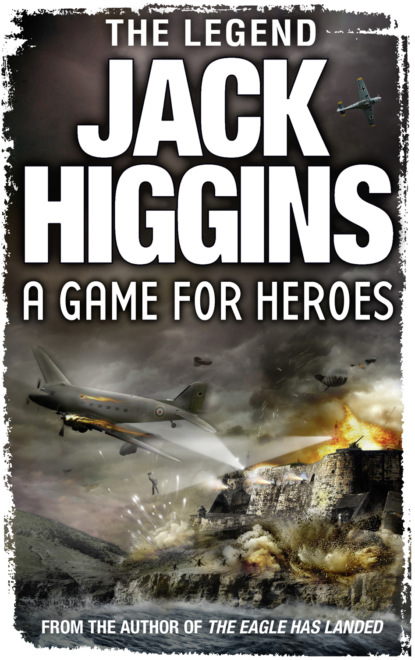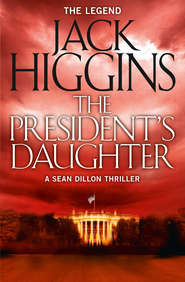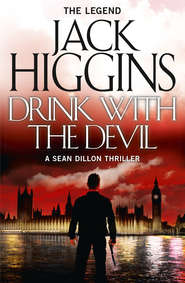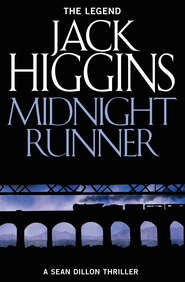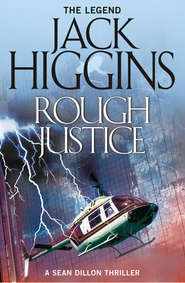По всем вопросам обращайтесь на: info@litportal.ru
(©) 2003-2024.
✖
A Game for Heroes
Автор
Год написания книги
2018
Настройки чтения
Размер шрифта
Высота строк
Поля
‘You forfeit all privileges of rank.’ It was at this point that he sat down. ‘You work, Colonel Morgan. There is plenty of work for you here. You work in chains with the rest of your companions.’
There didn’t seem much point in quoting the Geneva Convention, but in any case, Steiner was speaking. ‘I must again stress the gallant nature of Colonel Morgan’s conduct this morning …’
‘Which is noted, Steiner,’ Radl said calmly. ‘You are dismissed now.’
Steiner stayed where he was for a long moment while I prayed for him to get out of it. His face showed real emotion for the first time since I’d known him and he started to speak again.
Radl cut in on him again and gently, perhaps because of that Knight’s Cross that hung from Steiner’s neck, the one medal for valour they all respected, the one that meant the wearer shouldn’t really be here.
‘You are dismissed, Steiner.’
Steiner saluted, swung on heel and Radl said, ‘You may take Colonel Morgan to join the others now, Brandt.’
‘Hasn’t anybody bothered to tell you how the war’s going?’ I said. ‘In case they didn’t, it’s just about over and your side lost.’
Punctilious to the last, he saluted me gravely. I laughed in his face and walked out.
We drove up to Fort Edward on the point above Charlottestown. It was the largest of the four Victorian naval forts built in the eighteen-fifties during the period when the English government of the day was worried about its relations with France.
There was a sentry at the gate beside a machine gun in a sand-bagged emplacement and he waved us through the granite archway with Victoria Regina and the date 1856 carved above it.
Inside, grass grew between the cobbles which was nothing new, but several concrete gun emplacements were and there were trucks parked across the courtyard and a notice that indicated the presence of some kind of artillery unit. We got out of the field car and Brandt waved me on politely towards the wooden doors of the old blockhouse which stood open.
One of his police corporals hurried ahead and when we went inside, he had the leg irons ready. Brandt turned, face pale, and said in English, ‘I am sorry, Colonel. A bad business, but a soldier’s duty is to obey orders.’
‘Get on with it, then,’ I told him.
The corporal dropped to his knees and quickly snapped the steel collars around my ankles and tightened them with a screw key. The chain between them was a little over two feet in length which allowed me to shuffle along at quite a reasonable rate.
‘Where to now?’ I demanded.
Brandt led the way without a word. We mounted the stone steps at the side of the blockhouse to the lower ramparts and walked towards the end of the point. As a boy of fourteen I had stood up there once a thousand years ago and watched the sea take my father. Now it was an artillery position and the walls were considerably knocked about, presumably by the naval bombardment of the previous year.
I could hear someone singing softly in German, a slow, sad old song from the first war. Argonnerwald, Argonnerwald, a quiet graveyard now thou art. We mounted to the second terrace and surprised a young sixteen year old masquerading as a soldier, who lounged beside an ammunition store, his rifle against the wall.
He jumped to attention rigidly and Brandt sighed and patted him gently on the head. ‘One of these days, Durst, I will really have to put you on a charge.’
I liked him for that, which is something to be able to say about any kind of a military policeman. He unbolted the door and stood to one side. ‘Colonel,’ he said.
I moved in, the doors closed behind me. There was plenty of light in there from the old gun ports. Plenty of light and good sea air and rain pouring down the slimy walls. They were all waiting to greet me. Fitzgerald, Grant, Sergeant Hagen and Corporal Wallace. So Stevens and Lovat had been the unlucky ones, depending, of course, on how you looked at it.
‘Christ Jesus, it’s the colonel,’ Hagen said.
Fitzgerald didn’t seem to be able to think of anything to add to that and I smiled amiably at him. ‘What was it your orders said? You will not repeat not attempt to land or provoke any incidents of a kind liable to alert the enemy to your presence. Enjoy yourself, did you?’
If he’d had a gun, he would have shot me dead, but all he did have was his fine aristocratic pride and it wasn’t going to allow him to quarrel with riff-raff like me. He walked to the other end of the room and sat down.
Grant took a quick step towards me, those great hands of his clenched, forgot his leg irons and fell on his knees.
‘Now then, Sergeant,’ I chided him. ‘That’s the trouble with you Rangers, No respect for rank.’
I scrambled up to the old gun platform. Rain drifted in a fine spray through the open ports and I produced my faithful waterproof tin, selected a cigarette, lit it and tossed the tin down to Hagen.
The view was really quite magnificent. On a good day it was possible to see Guernsey on the horizon thirty-five miles to the north-east, but not on a morning like this. And to the north-west, a hundred miles or more away across the Channel was the Cornish coast and Lizard Point where it had all started. Four days ago. It didn’t seem possible.
1
The King of the First Four Hundred (#u88289645-0591-5f11-85ca-bcefbea37628)
The beach below the cottage on the cliffs two miles from Lizard Point, was blocked by the usual tangle of rusting barbed wire and the notice half-way down the track warned of mines.
It was an empty threat and something of a joke in the area, for the sergeant in charge of the operation, back in 1940, a local man, had seen little point in ruining one of the best surf fishing beaches in Cornwall.
It was thanks to this that I was able to swim from its white sands on that fine early April morning. It was unbelievably warm for the time of the year and the war had ceased to exist for me, was almost over anyway. I swam towards the spear of rock, climbed out and rested for a while.
Mary sat at her easel half-way along the beach, an old straw hat shading her from the sun, and painted the headland for what must have been the tenth time, although she argued that it always looked different, depending on her mood. She turned and looked out to sea searching for me, then waved. I waved back, dived in and started to swim for the shore.
She was waiting for me, a towel ready in one hand, my eye patch in the other. Not that my scarred face bothered her particularly. She had been a nurse too long for that, but she knew it still bothered me.
I dried my face, pulled on the patch and grinned.
‘Marvellous out there. You should try it.’
‘No thanks. Ask me again around July. I’ll go up and see about lunch, Owen. Don’t be long.’
She gave me a light kiss on the forehead and I watched her go through the wire and start up the path, aware of a kind of nostalgic affection and nothing more than that, which made me feel guilty on occasion.
We had met as students before the war and when they had carried me into that military hospital in Surrey five months previously pumped full of drugs and barely conscious, hers had been the first face I had seen on waking. Her husband had been killed in action, navigating a Lancaster in the Dresden raid. We had been living together for three months now, ever since my discharge from hospital.
I took my time about dressing, then walked across to the easel. She’d only got as far as the sketching stage with this one, but it was good – damned good. I picked up a piece of charcoal and tried a line or two myself, but without much success. Where perspective is concerned, two eyes are better than one and although I seemed to have adjusted in most things, I had a feeling that my painting days were over.
I lay down on the sand and pillowed my head in my hands, narrowing that one good eye to focus on a razorbill that dropped through space for a perfect landing on the cliff face.
It was all so incredibly peaceful. Only the sea rushing in, the cry of a gull, a white cloud drifting. Who was I, then? Owen Morgan, sometime artist – of sorts. Novelist – very much so. Poet – debatable. Soldier, walker-in-darkness, hired bravo, cut-throat. It all depended on your point of view. And what was I doing caught in this pleasant limbo where one day eased into another and the horizon’s rumble was thunder and not guns?
I must have slept, but only briefly. A gull cried harshly bringing me back to life. I was instantly awake, a habit hard come by in dark places, and got to my feet. If I didn’t look sharp there would be Mary seeking me, the dinner burning and the devil to pay.
I went through the wire and started up the path, head down. I had barely reached the warning notice when a voice called, ‘You down there!’
I glanced up, squinting into the sun and saw an American army officer standing on the brow of the hill, although who or what he was, it was impossible to say from that position with the sun behind him.
‘I want a word with you,’ he said.
It wasn’t a request, but an order delivered in fine Bostonian tones, the kind of voice you get in New England and nowhere else in America and usually from a member of that happy little band whose ancestors stampeded to be first ashore from the Mayflower. I didn’t like his voice and I didn’t like him for all sorts of excellent reasons so I didn’t bother to reply.
He spoke again with an edge of exasperation to his voice. ‘I am looking for Colonel Morgan. They told me at the house that he would be down on the beach. Have you seen him?’
Looking back on it now, I can find every excuse for him. He was gazing down on a small, dark man, badly in need of a shave and the old blue Guernsey sweater and the black eye patch didn’t help. And neither, I suppose, did the gold ring I was wearing in my left ear at the insistence of Jack Trelawney, the landlord of the Queen’s Arms up the road towards Falmouth, who believed implicitly that it would improve my sight and had pierced my ear lobe on one memorable evening with a darning needle and the assistance of half a bottle of pre-war Scotch.





